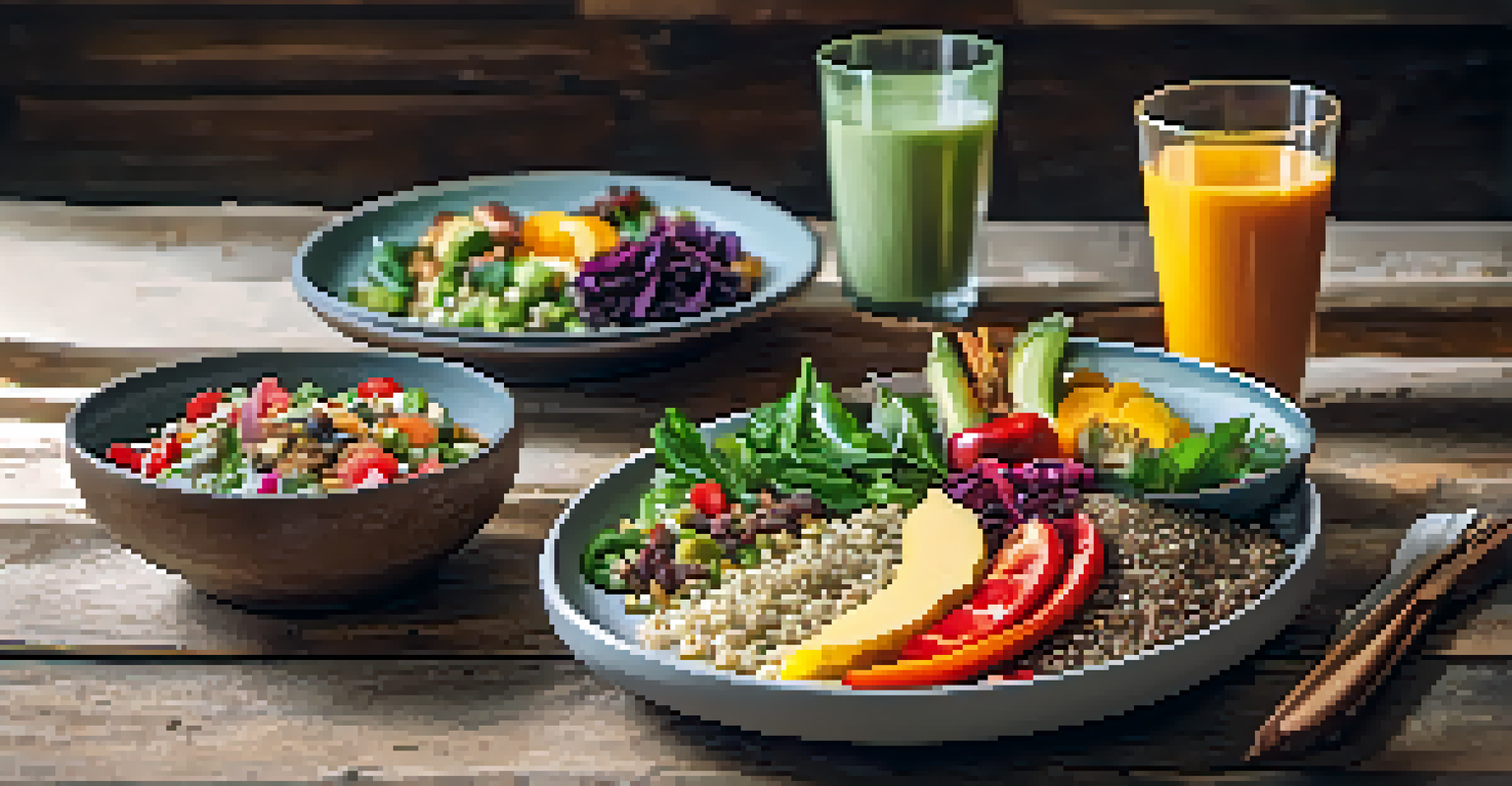Plant-Based Diets: Changing Attitudes Among Consumers

The Rise of Plant-Based Diets in Modern Society
Over the past few years, plant-based diets have surged in popularity, attracting attention from diverse demographics. This shift is largely driven by a growing awareness of health benefits, environmental concerns, and ethical considerations surrounding animal welfare. Many consumers are now open to exploring alternatives to traditional meat-based meals, seeking out options that align with their values.
Let food be thy medicine and medicine be thy food.
For instance, grocery stores and restaurants are increasingly stocking plant-based products, from meat substitutes to dairy alternatives, catering to this rising demand. This availability makes it easier for consumers to make the switch, even if they are not fully committed to a vegan or vegetarian lifestyle. The culinary world is responding to this trend by creating innovative, delicious plant-based dishes that appeal to a wide range of palates.
Moreover, social media plays a significant role in shaping perceptions, with influencers and celebrities often promoting plant-based eating. As more people share their experiences and recipes online, it fosters a sense of community and encourages others to join the movement, making plant-based diets more mainstream.
Health Benefits Driving Consumer Choices
Health is a primary motivator for many consumers shifting toward plant-based diets. Numerous studies have linked plant-based eating to lower risks of chronic diseases, such as heart disease, diabetes, and obesity. As consumers become more health-conscious, they are increasingly interested in incorporating nutrient-dense foods into their diets.

For example, foods rich in fiber, vitamins, and antioxidants can improve overall well-being, and many people find that they feel more energetic and vibrant after adopting a plant-based lifestyle. This has led to an explosion of interest in various foods, including leafy greens, legumes, whole grains, and nuts, which are all integral to a balanced plant-based diet.
Health Benefits Drive Plant-Based Choices
Many consumers are shifting to plant-based diets due to the health benefits, including lower risks of chronic diseases and increased energy levels.
As the conversation around health continues to evolve, consumers are also becoming more aware of the importance of mental health and emotional well-being. Many individuals report feeling a sense of fulfillment from making environmentally conscious choices, further reinforcing their commitment to plant-based living.
Environmental Awareness and Sustainability Concerns
The impact of food choices on the environment is another significant factor influencing consumer attitudes towards plant-based diets. With climate change becoming an urgent global issue, many people are reevaluating their dietary habits to reduce their carbon footprint. Plant-based diets are often seen as a more sustainable option compared to meat-heavy diets, which require extensive resources for production.
The greatest threat to our planet is the belief that someone else will save it.
For instance, studies have shown that livestock farming is a major contributor to greenhouse gas emissions, while plant-based agriculture generally has a lesser environmental impact. This knowledge encourages consumers to make more sustainable choices, prioritizing foods that are not only healthier for them but also for the planet.
As documentaries and research highlighting the environmental benefits of plant-based eating gain traction, consumers are more likely to engage with these concepts. This growing awareness is leading to a cultural shift, where choosing plant-based options is seen as a responsible and informed decision.
Changing Perceptions of Meat Alternatives
In the past, meat alternatives were often viewed as bland or unappetizing, but this perception is rapidly changing. Today, brands are innovating to create plant-based products that closely mimic the taste and texture of meat, making them more appealing to a broader audience. This evolution is crucial as it allows even non-vegetarians to explore these alternatives without sacrificing flavor.
For instance, companies like Beyond Meat and Impossible Foods have developed products that have gained popularity in mainstream markets, offering consumers a familiar taste experience. As these alternatives become more widely accepted, they pave the way for new culinary possibilities and help normalize plant-based eating in everyday life.
Environmental Concerns Influence Eating
Growing awareness of the environmental impact of food choices is leading consumers to adopt plant-based diets as a more sustainable option.
Moreover, the narrative surrounding meat alternatives is shifting from being merely health-focused to one that encompasses enjoyment and culinary exploration. This transformation encourages consumers to experiment with new ingredients and dishes, fostering a more adventurous approach to cooking.
The Role of Social Media in Shaping Attitudes
Social media has become a powerful tool in influencing consumer attitudes toward plant-based diets. Platforms like Instagram, TikTok, and YouTube are filled with vibrant food photography, recipe videos, and success stories from those who have adopted plant-based lifestyles. This visual appeal draws in viewers and inspires them to try their hand at plant-based cooking.
Additionally, social media enables influencers and chefs to showcase their creativity, making plant-based meals more approachable and enticing. As followers see their favorite personalities enjoying delicious plant-based dishes, it normalizes the idea of incorporating more plants into their own diets.
Furthermore, online communities provide support and resources for those interested in transitioning to a plant-based lifestyle. This sense of belonging can make a significant difference for individuals who might feel overwhelmed or unsure about making dietary changes.
Challenges Faced by Consumers Transitioning to Plant-Based Diets
While the shift towards plant-based diets is promising, consumers often face several challenges during the transition. One common hurdle is the perceived lack of convenience, as some may believe that plant-based cooking requires more time and effort. However, with meal prepping and easy recipes available online, many find that it’s easier than they expected.
Another challenge is navigating social situations, where meat-centric meals are often the norm. Consumers might feel pressure to conform or worry about being judged for their choices. Yet, as plant-based diets gain popularity, more restaurants and social gatherings are beginning to offer inclusive options, making it easier for everyone to enjoy meals together.
Social Media Shapes Plant-Based Trends
Social media platforms play a crucial role in normalizing plant-based eating by showcasing appealing recipes and fostering supportive communities.
Lastly, some individuals may struggle with cravings for familiar comfort foods. However, with the growing variety of plant-based substitutes available, many find satisfying alternatives that can help ease the transition while still allowing them to enjoy their favorite flavors.
Future Trends in Plant-Based Eating
Looking ahead, the future of plant-based diets appears bright, with ongoing innovations and trends set to shape consumer attitudes further. As food technology advances, we can expect even more exciting plant-based products that cater to different tastes and dietary needs. This will likely encourage more people to experiment with plant-based eating, making it a viable option for diverse lifestyles.
Moreover, educational initiatives aimed at promoting the benefits of plant-based diets are gaining traction. Schools, workplaces, and community organizations are increasingly offering workshops and resources to help individuals understand the advantages of incorporating more plants into their meals.

As the dialogue around food continues to evolve, we may also see a shift towards hybrid diets that blend plant-based options with traditional meals. This flexibility could appeal to a wider audience, allowing more people to embrace plant-based eating without feeling restricted.